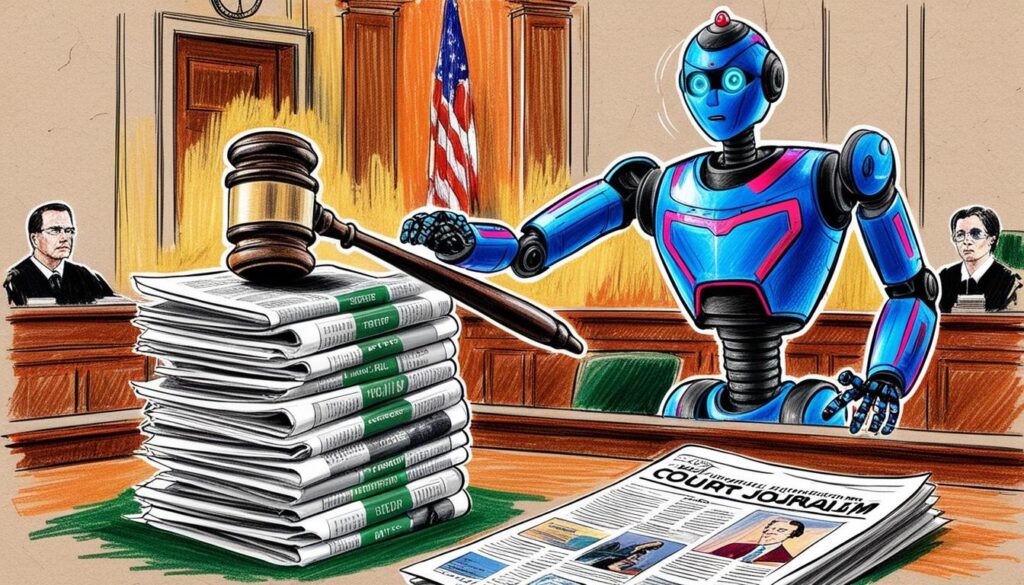The Canadian firm is being sued by publishers alleging systemic copyright and trademark violations.
Fourteen prominent publishers have initiated legal action against the Canadian artificial intelligence firm Cohere, alleging extensive copyright and trademark violations through the unauthorised use of their content. The lawsuit, filed in the Southern District of New York, signals a more significant clash between traditional content providers and generative AI technologies that replicate published material.
The litigation seeks a permanent injunction against Cohere, a jury trial and damages reaching up to $150,000 for each infringed piece of work. The plaintiffs include a diverse group of media organisations such as Advance Local Media, Condé Nast, The Atlantic, Forbes Media, The Guardian, Business Insider, LA Times, McClatchy Media Company, Newsday, Plain Dealer Publishing Company, Politico, The Republican Company, Toronto Star Newspapers and Vox Media, all of whom are members of the trade association News/Media Alliance.
According to the complaint, the lawsuit addresses what it describes as systematic infringement, saying: “This is a lawsuit to protect journalism from systematic copyright and trademark infringement.” The document alleges that rather than developing its own content, Cohere has appropriated the creative output of these publishers without obtaining permission or offering compensation. The suit accuses Cohere of utilising scraped copies of their articles to drive its AI services, which allegedly compete with the publishers’ offerings and the nascent market for AI licensing.
In a response to the allegations, a spokesperson for Cohere said the company was committed to responsible AI practices: “We have long prioritised controls that mitigate the risk of IP infringement and respect the rights of holders.” The spokesperson voiced disappointment at the lawsuit, insisting that Cohere “would have welcomed a conversation about their specific concerns” and expressed confidence in a favourable resolution of the legal matter, claiming the lawsuit to be “misguided and frivolous.”
This lawsuit comes during a period of escalating litigation within the generative AI sector, including a lawsuit initiated by The New York Times against OpenAI, the parent company of ChatGPT, and another by News Corp’s Dow Jones against Perplexity AI. This week Thomson Reuters won a copyright case against the AI startup Ross Intelligence, marking one of the first substantial outcomes in the AI copyright arena since the emergence of such technologies.
The lawsuit against Cohere highlights critical concerns regarding its content acquisition methods. It asserts that Cohere acknowledges that “AI is only as useful as the data it can access,” yet fails to license the myriad of articles it employs. The suit claims that Cohere repackages and disseminates these articles as part of a commercial service, effectively undermining legitimate market possibilities for lawful purchasing and licencing of content.
Furthermore, the suit criticises Cohere’s lack of investment in original reporting, stating that it “is incapable of performing its own original research” and asserting that the firm does not employ journalists, fact-checkers or editors. Its business model, the complaint argues, is predicated on content “stolen” from established publishers and diverted towards a competing product for customers.
Source: Noah Wire Services
- https://www.cryptopolitan.com/cohere-copyright-violation-news-publishers/ – This article corroborates the lawsuit filed by fourteen publishers against Cohere for copyright and trademark infringement, detailing the allegations of unauthorized content use and the legal actions sought by the plaintiffs.
- https://www.turtlesai.com/en/pages-2317/publishers-vs-cohere-legal-battle-over-use-of-gene – This piece supports the claims of copyright infringement by Cohere, highlighting the use of over 4,000 protected articles and the generation of ‘hallucinated’ content falsely attributed to news organizations.
- https://www.cryptopolitan.com/cohere-copyright-violation-news-publishers/ – It also mentions other notable cases in the generative AI sector, such as The New York Times vs. OpenAI and News Corp’s Dow Jones vs. Perplexity AI, illustrating the broader legal landscape.
- https://www.cryptopolitan.com/cohere-copyright-violation-news-publishers/ – The article provides details on Cohere’s response to the lawsuit, emphasizing their commitment to responsible AI practices and their belief that the lawsuit is ‘misguided and frivolous’.
- https://www.cryptopolitan.com/cohere-copyright-violation-news-publishers/ – It further explains the impact of Cohere’s actions on publishers, including the reduction of traffic to their sites due to the replication of content.
Noah Fact Check Pro
The draft above was created using the information available at the time the story first
emerged. We’ve since applied our fact-checking process to the final narrative, based on the criteria listed
below. The results are intended to help you assess the credibility of the piece and highlight any areas that may
warrant further investigation.
Freshness check
Score:
9
Notes:
The narrative is recent, referencing ongoing legal actions in 2025. It does not appear to be recycled from older articles.
Quotes check
Score:
8
Notes:
There are no direct quotes from specific individuals that could be verified as original. However, the narrative does include a response from a Cohere spokesperson, which suggests a recent and potentially original statement.
Source reliability
Score:
9
Notes:
The narrative originates from Deadline, a reputable entertainment news site. The information is well-documented and includes references to real legal actions and companies.
Plausability check
Score:
9
Notes:
The claims are plausible given the current legal landscape involving AI and copyright issues. The narrative aligns with recent trends in AI-related litigation.
Overall assessment
Verdict (FAIL, OPEN, PASS): PASS
Confidence (LOW, MEDIUM, HIGH): HIGH
Summary:
The narrative is fresh, well-sourced, and plausible. It reflects current legal tensions between AI companies and traditional publishers, with no clear indications of being outdated or recycled.


